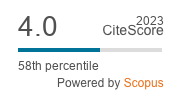Review on load frequency control for power system stability
Muhammad Nizam Kamarudin, Nabilah Shaharudin, Noor Haqkimi Abd Rahman, Mohd Hendra Hairi, Sahazati Md. Rozali, Tole Sutikno
Abstract
Power system stability is the capability of power systems to maintain load magnitude within specified limits under steady state conditions in electrical power transmission. In modern days, the electrical power systems have grown in terms of complexity due to increasing interconnected power line exchange. For that, an inherent of controllers were essential to correct the deviation in the presence of external disturbances. This paper hence aims to review the basic concepts of power system stability in load frequency control. Various control techniques were analyzed and presented. Power system stability can be classified in terms of method to improve power system stability, which are rotor angle stability, frequency stability and voltage stability. It is found that each method has different purpose and focus on solving different types of problem occurred. It is hoped that this study can contribute to clarify the different types of power system stability in terms of where it occurs, and which is the best method based on different situation.
Keywords
load frequency control; power system stability;
DOI:
http://doi.org/10.12928/telkomnika.v19i2.16118
Refbacks
There are currently no refbacks.
This work is licensed under a
Creative Commons Attribution-ShareAlike 4.0 International License .
TELKOMNIKA Telecommunication, Computing, Electronics and Control Universitas Ahmad Dahlan , 4th Campus+62 274 564604
<div class="statcounter"><a title="Web Analytics" href="http://statcounter.com/" target="_blank"><img class="statcounter" src="//c.statcounter.com/10241713/0/0b6069be/0/" alt="Web Analytics"></a></div> View TELKOMNIKA Stats


